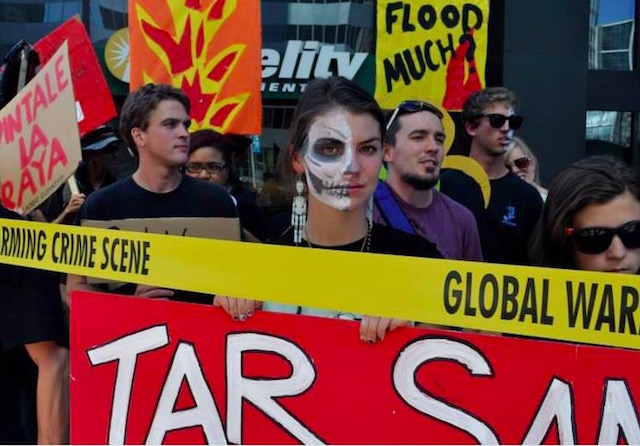
Although Pope Francis has given a renewed ethical motivation to the environmental and social justice movements, he just admitted, during his Latin American visit, that he has no detailed prescription or solution to the crisis caused by global capitalism: “Don’t expect a recipe from this Pope.”
But there are solutions and all of them need to be implemented in order to slow the capitalist machine—so well greased by oil that it is careening out of control.
First, at the very least, subsidies to fossil fuel companies should cease! Further, divesting from these fossil fuel companies should increase apace
By decentralizing renewable energy and revolutionizing urban transportation, our cities and public transit can be made more desirable than our present traffic-clogged cities with their ugly parking lots filled with private cars.
Meanwhile there needs to be continued friction in the form of environmental direct action, resistance, protests, blockades and even joint sabotage by students, workers and Indigenous peoples. Never underestimate the power of grassroots activity.
Reining in our overconsumption helps, as does re-localizing our economies as part of the solution.
But still toxic extraction will continue, especially in poor countries like India, which need money to do things green, sustainable and renewable—and this requires international cooperation and generosity.
Such developing countries are squeezed between the impacts of climate change and poverty.
And in the current economic system, alleviating poverty can be done cheaply by burning carbon. These developing countries need the help of those countries and corporations that grew wealthy through the high emissions that are the cause of our present global crisis. These are countries where solar and wind power are viable alternatives if richer countries and corporations would help them move to a low-emissions economy.
But the fossil fuel corporations and governments supported by them are actively resisting such alternatives and are not above playing dirty.
Consider this: in January 2015, Priya Pillai, a Green Peace activist from India, was prevented from flying to Britain, where she was scheduled to brief Parliament on the effects of mining on Indigenous communities in central India. Priya had been fighting coal mining in the Mahan forest, which hurts 54 tribal villages in the area by destroying hundreds of thousands of trees, ending the livelihoods of those villagers who rely on forest produce.
India is targeting Greenpeace, Action Aid, Oxfam, Amnesty International, and other NGOs, which try to address pollution and other problems, which India prefers to ignore in order to preserve its image for foreign investment. These NGOs are being labeled by Prime Minister Modi’s Indian government as “anti-development,” according to the New York Times Feb.15, 2015.
Individuals, corporations and governments need to re-educate habits and priorities. This planet, as the Pope says, is “our common home.”
It is also a ticking time bomb!
~
Relephant read:
What Extreme Winter Weather Tells us About Climate Change.
Author: Linda Lewis
Editor: Ashleigh Hitchcock
Photo: courtesy of Emma Ruffin
 Share on bsky
Share on bsky

Read 4 comments and reply